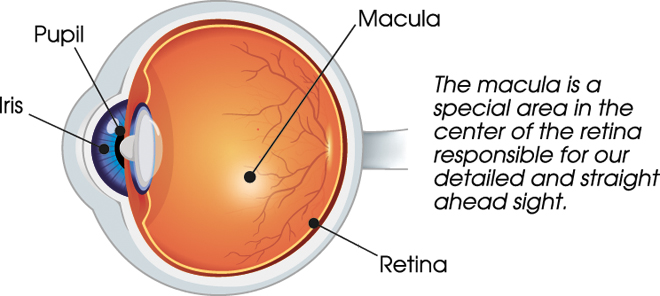February is Age-related Macular Degeneration (AMD) awareness month, and for good reason. AMD is one of the leading causes of serious and permanent vision loss in people ages 50 and older. As we age, oxidative stress can create cell-damaging free radicals that cause the macula, a tiny space near the center of the retina, to deteriorate, destroying central vision.
Central vision is responsible for capturing fine details and enabling tasks like reading, watching TV, driving, recognizing faces and unlimited other tasks, making AMD a potentially perilous disorder. People who smoke, maintain high cholesterol levels, have close relatives with AMD or are of European ancestry can be particularly vulnerable, but aging alone can leave anyone susceptible.

“One of the problems with AMD is that it often goes undiagnosed until a person’s vision becomes noticeably worse,” says ophthalmologist Vinay Gutti, MD. “A patient may notice a dark, blank or skewed spot in their central vision or find it difficult to adjust to sudden changes in light, such as when entering a dark room from a well-lit area, or vice versa. People may begin to rely more and more on their peripheral vision, and by the time they seek treatment, most will have permanent vision loss. That’s why we want people to be aware of AMD, and hopefully motivated to schedule regular comprehensive eye exams to catch
AMD early.”
AMD comes in two forms, dry and wet. About 90% of cases are Dry AMD, in which oxidative stress thins the macula, usually causing slow but steady vision loss.
Wet AMD is the more serious of the two forms, causing the formation of weak, abnormal blood vessels in the choroid layer beneath the retina. These fragile vessels typically leak fluid or blood, usually resulting in rapid and severe vision loss. Most cases of Wet AMD start out as Dry AMD, so the condition should be managed as quickly as possible to prevent it from worsening. “If you have noticed unexplained changes in vision, schedule an exam with your eye care specialist right away,” says Dr. Gutti. “The sooner we discover AMD, the quicker we can take steps to help prevent its advancement.”
During a comprehensive exam, your doctor will study your maculae using a specialized, detail-sensitive lens. He or she may also take sophisticated digital photographs of the retina, macula and other areas of the eye. Your doctor will also have you focus on the lines of a simple test called an Amsler Grid, which helps to identify warping or skewing of lines, a sign of AMD. You will also be given an Amsler Grid for home use so you can take part in monitoring your vision for changes.
Treating and Managing AMD
If you are diagnosed with Dry AMD, your doctor may recommend specific potencies of certain nutritional supplements to help slow or stop the advance of the disease.
Although there is no cure for Wet AMD, it can be managed to slow or prevent further damage and, in some cases, help correct some vision loss. Treatments include:
VEGF Blockers – Vascular endothelial growth factor (VEGF) blockers are specialized drugs that are injected into the vitreous of the eye to help arrest the growth of abnormal blood vessels beneath the retina. This is the most common treatment for Wet AMD and may improve vision in some patients. When necessary, your Lake Eye doctor will refer you to a retina specialist who performs this procedure.
Laser Surgery – Some Wet AMD cases respond favorably to laser surgery, which utilizes a beam of light to seal off leaking blood vessels and help slow or stop fluid from further damaging the macula. This quick, outpatient procedure may be used in conjunction with a drug designed for AMD laser treatment. Your Lake Eye doctor will refer you to a retina specialist to determine if this treatment is an option for you.
“When it comes to AMD, the best course of action is early discovery and effective measures that help inhibit progression of the disease,” says Dr. Gutti. “Catching AMD before it develops symptoms is paramount in preserving vision.”
If you’re 50 or older and haven’t had a comprehensive eye exam within the past two years, we highly recommend calling your local Lake Eye and scheduling an appointment. Your eyes will thank you for it.
Lake Eye Associates
352-750-2020
lakeeye.com
Check Also
Recurrent UTIs: Addressing the Risk of Antibiotic Resistance
Urinary tract infections (UTIs) are common bacterial infections that affect millions of individuals worldwide each …
 Central Florida Health and Wellness Magazine Health and Wellness Articles of the Villages
Central Florida Health and Wellness Magazine Health and Wellness Articles of the Villages



